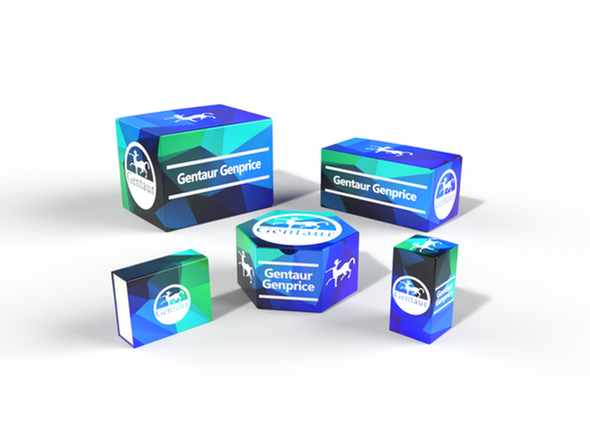740
Human Agouti Related Protein (AGRP) ELISA Kit | AE24301HU
- SKU:
- 740-AE24301HU
- Availability:
- Usually ships in 5 working days
Description
Human Agouti Related Protein (AGRP) ELISA Kit | AE24301HU | Gentaur UK, US & Europe Distribution
Species Reactivity: Human (Homo sapiens)
Abbreviation: AGRP
Alternative Name: AGRT; ART; ASIP2; MGC118963; agouti related protein
Application: ELISA
Range: 7.81-500 pg/mL
Sensitivity: 3.1 pg/mL
Intra-Assay: ≤5.4%
Inter-Assay: ≤7.9%
Recovery: 0, 88
Sample Type: Serum, Plasma, Other biological fluids
Detection Method: Sandwich
Analysis Method : Quantitive
Test Principale: This assay employs a two-site sandwich ELISA to quantitate AGRP in samples. An antibody specific for AGRP has been pre-coated onto a microplate. Standards and samples are pipetted into the wells and anyAGRP present is bound by the immobilized antibody. After removing any unbound substances, a biotin-conjugated antibody specific for AGRP is added to the wells. After washing, Streptavidin conjugated Horseradish Peroxidase (HRP) is added to the wells. Following a wash to remove any unbound avidin-enzyme reagent, a substrate solution is added to the wells and color develops in proportion to the amount of AGRP bound in the initial step. The color development is stopped and the intensity of the color is measured.
Product Overview: Agouti-related protein is a neuropeptide produced in the brain (in the arcuate nucleus of the hypothalamus) by the AgRP/NPY neuron that increases appetite and decreases metabolism and energy expenditure. It is one of the most potent and long-lasting of appetite stimulators. Understanding the role AgRP plays in weight gain may assist in developing pharmaceutical models for treating obesity. It was identified independently by two teams based on sequence similarity with Agouti signalling peptide, a protein synthetized in the skin that controls coat color.The appetite stimulating effects of AgRP are inhibited by the hormone leptin. Adipocytes secrete leptin in response to food intake. This hormone acts in the arcuate nucleus and inhibits the AgRP/NPY neuron from releasing orexigenic peptides.
Stability: The stability of ELISA kit is determined by the loss rate of activity. The loss rate of this kit is less than 5% within the expiration date under appropriate storage condition. The loss rate was determined by accelerated thermal degradation test. Keep the kit at 37°C for 4 and 7 days, and compare O.D.values of the kit kept at 37°C with that of at recommended temperature. (referring from China Biological Products Standard, which was calculated by the Arrhenius equation. For ELISA kit, 4 days storage at 37°C can be considered as 6 months at 2 - 8°C, which means 7 days at 37°C equaling 12 months at 2 - 8°C) .






